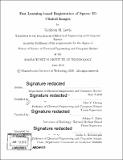Fast learning-based registration of sparse 3D clinical images
Author(s)
Lewis, Kathleen M.(Kathleen Marie)
Download1122563949-MIT.pdf (4.579Mb)
Alternative title
Fast learning-based registration of sparse three-dimensional clinical images
Other Contributors
Massachusetts Institute of Technology. Department of Electrical Engineering and Computer Science.
Advisor
John V. Guttag and Adrian V. Dalca.
Terms of use
Metadata
Show full item recordAbstract
We introduce SparseVM, a method to register clinical 3D MR scans faster and more accurately than previously possible. Deformable alignment, or registration, of clinical scans is a fundamental task for many medical image applications such as longitudinal population studies. Most registration algorithms are designed for high-resolution research-quality scans, and under-perform when applied to clinical data. Clinical scans present unique challenges because, in contrast to research-quality scans, clinical scans are often sparse, missing up to 85% of the slices available in research scans. We build on a state-of-the-art learning-based registration method to improve the accuracy of sparse clinical image registration. We evaluate our method on both a clinically-acquired MRI dataset of stroke patients, and on a simulated sparse clinical scan dataset. SparseVM registers MR scans in under a second on a GPU, which is over 1000 x faster than the most accurate clinical registration methods, without compromising accuracy. SparseVM has statistically significant improvements in runtimes over all baselines, and a statistically significant improvement in accuracy over the fastest baseline. Because of these contributions, SparseVM enables clinical analyses that were not previously possible. Our code is publicly available at voxelmorph. mit . edu.
Description
Thesis: S.M., Massachusetts Institute of Technology, Department of Electrical Engineering and Computer Science, 2019 Cataloged from PDF version of thesis. Includes bibliographical references (pages 37-40).
Date issued
2019Department
Massachusetts Institute of Technology. Department of Electrical Engineering and Computer SciencePublisher
Massachusetts Institute of Technology
Keywords
Electrical Engineering and Computer Science.